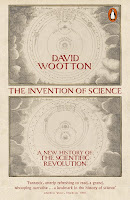Evangelista Torricelli – inventor of the barometer
Physicist's name lives on in scientific terminology
The inventor of the barometer, Evangelista Torricelli, died on this day in 1647 in Florence at the age of just 39. A disciple of Galileo, Torricelli made many mathematical and scientific advances during his short life and had an asteroid and a crater on the moon named after him. Torricelli was born into a poor family from Faenza in the province of Ravenna. He studied science under the Benedictine monk, Benedetto Castelli, a professor of Mathematics at the Collegio della Sapienza, now known as the Sapienza University of Rome, who had been a student of Galileo Galilei. After Galileo’s death the Grand Duke Ferdinand II de’ Medici asked Torricelli to succeed Galileo as Chair of Mathematics at the University of Pisa. Torricelli was also interested in optics and designed and built telescopes and microscopes. His most important invention was the mercury barometer, which he produced after he had discovered the principle of the barometer while trying to find a solution to the limitations of the suction pump in forcing water upwards. Scientific terms such as the Torricellian tube and Torricellian vacuum are named after the scientist, as is the torr, a unit of pressure in vacuum measurements. Read more…
______________________________________
Carlo Gnocchi – military chaplain
Remembering a protector of the sick and the mutilated
Carlo Gnocchi, a brave priest who was chaplain to Italy’s alpine troops during the Second World War, was born on this day in 1902 in San Colombano al Lambro, near Lodi in Lombardy. In recognition of his life, which was dedicated to easing the wounds of suffering and misery created by war, his birthday was made into his feast day when he was beatified by Pope Benedict XVI on October 25, 2009 in Milan. Gnocchi was the youngest of three boys born to Henry and Clementine Gnocchi. His father died when he was five years old and his two brothers died of tuberculosis before he was 13. He was ordained a priest in 1925 in the archdiocese of Milan and afterwards worked as a teacher. When war broke out he joined up as a voluntary priest and departed first for the front line between Greece and Albania and then for the tragic campaign in Russia, which he miraculously survived, despite suffering from frostbite. While he was chaplain to alpine troops in the war he helped Jews and Allied prisoners of war escape to Switzerland. During this time he was imprisoned for writing against Fascism. Read more…
________________________________________
Camillo Sivori – virtuoso violinist
Paganini’s successor was also a talented composer
Ernesto Camillo Sivori, a virtuoso violinist and composer, was born on this day in 1815 in Genoa. Remembered as the only pupil of the great virtuoso violinist Niccolò Paganini, Sivori began his career as a travelling virtuoso at the age of 12, having by then also studied with other violin teachers. He was acclaimed as ‘Paganini reincarnated’, or even, ‘Paganini without the flaws’, by music critics during a lengthy tour of Europe that he made between 1841 and 1845. During his travels he met some of the best-known composers of the day, such as Mendelssohn, Schumann and Berlioz and he took part in hundreds of concerts. After being compared to other celebrated violinists, his status as Paganini’s successor was confirmed, even though the great man had died in 1840 and was still remembered in the musical world. Sivori had met Paganini, who was also from Genoa, when he was seven years old and had made such a favourable impression on him that Paganini gave him lessons between October 1822 and May 1823. Paganini also wrote pieces of music for his pupil ‘to shape his spirit’ and even provided guitar accompaniment when Sivori performed these pieces privately. Read more…
______________________________________
Book of the Day: The Invention of Science: A New History of the Scientific Revolution, by David Wootton
We live in a world made by science. How and when did this happen? This book tells the story of the extraordinary intellectual and cultural revolution that gave birth to modern science, and mounts a major challenge to the prevailing orthodoxy of its history. Before 1492 it was assumed that all significant knowledge was already available; there was no concept of progress; people looked to the past for understanding, not the future. This book argues that the discovery of America demonstrated that new knowledge was possible: indeed it introduced the very concept of 'discovery', and opened the way to the invention of science. The first crucial discovery was Tycho Brahe's nova of 1572: proof that there could be change in the heavens. The telescope (1610) rendered the old astronomy obsolete. Torricelli's experiment with the vacuum (1643) led directly to the triumph of the experimental method in the Royal Society of Boyle and Newton. By 1750 Newtonianism was being celebrated throughout Europe. The new science relied on a new understanding of what knowledge might be, and with this came a new language: discovery, progress, facts, experiments, hypotheses, theories, laws of nature - almost all these terms existed before 1492, but their meanings were radically transformed so they became tools with which to think scientifically. The Invention of Science changes our understanding of how this great transformation came about, and of what science is.David Wootton is a British historian. He is Anniversary Professor of History at the University of York. His books include Paolo Sarpi: Between Renaissance and Enlightenment (1983), Bad Medicine: Doctors Doing Harm Since Hippocrates (2006) and Galileo: Watcher of the Skies (2010).
.jpg)



No comments:
Post a Comment